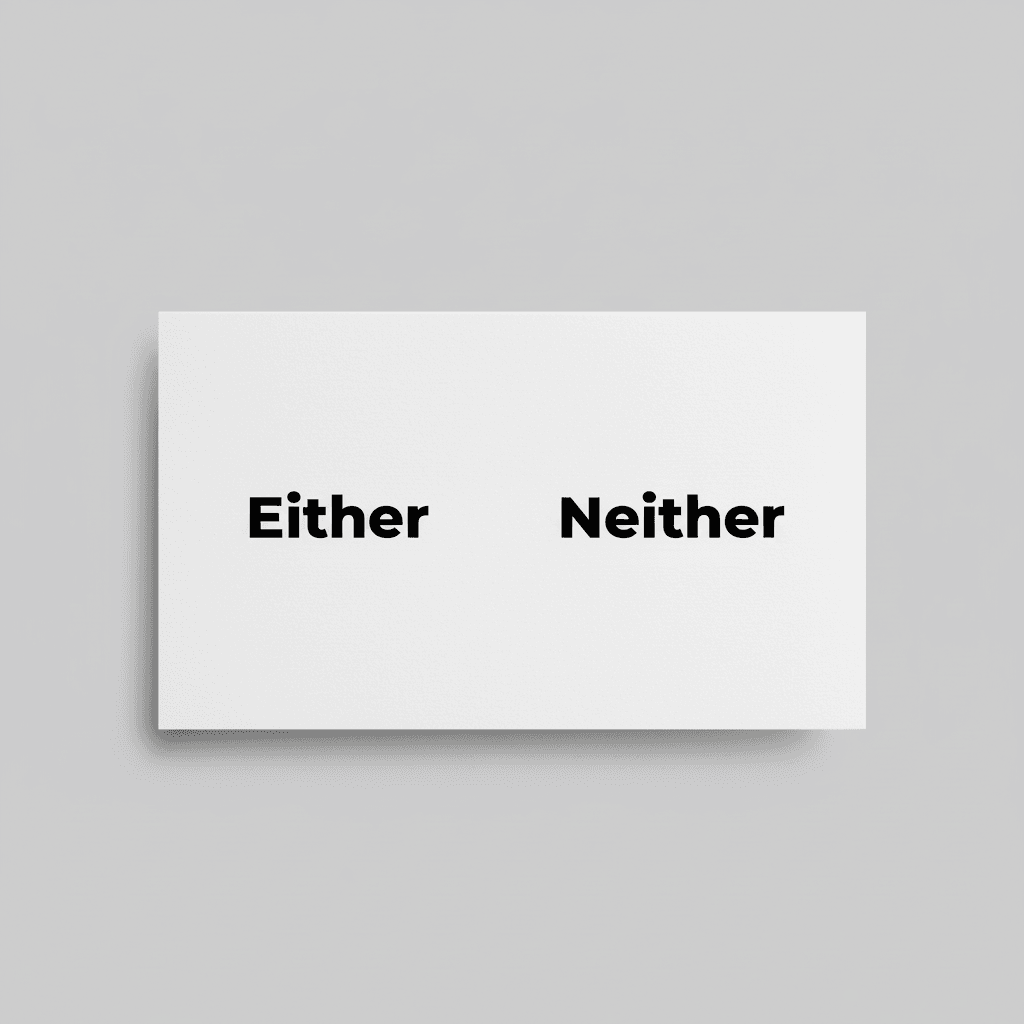Either vs. Neither: What’s the Difference?
 Both either and neither are used to talk about choices or agreement/disagreement, but they mean opposites.
Both either and neither are used to talk about choices or agreement/disagreement, but they mean opposites.
Here’s the key difference:
- Either means “one or the other.” (positive or neutral)
- Neither means “not one or the other.” (negative)
1. “Either” — One or the Other
Meaning
“Either” is used when there are two options and one can be chosen.
It can be used as a determiner, pronoun, adverb, or conjunction.
Examples (10 total)
- You can have either coffee or tea.
- Either answer is fine.
- I don’t mind — either option works for me.
- There are two ways to solve it; take either one.
- Either of them could win the race.
- She can sit on either side of the table.
- Call me on either number.
- You can park on either street.
- Either movie is good; I don’t have a preference.
- He can go by bus or train — either is okay.
🧠 Tip:
If it’s about choosing one of two, use either.
2. “Neither” — Not One or the Other
Meaning
“Neither” is the negative form of either.
It means not one and not the other — used when both options are rejected or false.
Examples (10 total)
- Neither answer is correct.
- Neither of the boys came to class.
- I like neither coffee nor tea.
- Neither restaurant is open today.
- Neither of them called me back.
- Neither plan seems practical.
- He chose neither side in the argument.
- Neither road leads to the station.
- Neither of the books is interesting.
- I could neither eat nor sleep last night.
🧠 Tip:
If both choices are negative or false, use neither.
3. Quick Comparison Table
| Function | Either | Neither |
|---|---|---|
| Meaning | One or the other | Not one or the other |
| Polarity | Positive / neutral | Negative |
| Example (Determiner) | Either choice is fine. | Neither choice is right. |
| Example (Pronoun) | Either will do. | Neither will do. |
| Example (Conjunction) | You can have either tea or coffee. | I want neither tea nor coffee. |
| Agreement Form | “I don’t like it.” “Me either.” (informal) | “I don’t like it.” “Me neither.” (informal, same meaning) |
4. Using “Either” and “Neither” in Sentences
As Conjunctions
- Either… or… → connects two positive options.
Example: You can stay either here or there. - Neither… nor… → connects two negative options.
Example: Neither John nor Mary is coming.
As Pronouns
- Either → refers to one of two.
Example: Either is okay. - Neither → refers to none of two.
Example: Neither is acceptable.
As Adverbs
- Either → used in negative sentences to mean “also.”
Example: I don’t like it either. - Neither → used in responses to show agreement in the negative.
Example: I don’t like it. — Neither do I.
5. How to Remember
👉 Either = One (choose one option)
👉 Neither = None (choose nothing)
💡 Memory Trick:
“E” in Either stands for “one.”
“N” in Neither stands for “none.”
6. Common Mistakes
❌ I don’t like either movies.
✅ I don’t like either movie. (only two choices)
✅ I don’t like any of the movies. (more than two)
❌ Neither of the three options is correct.
✅ None of the three options is correct.
❌ I don’t like it too.
✅ I don’t like it either. (use either, not too)
7. Why Learners Get Confused
Both words can be used in negative sentences, but either is usually paired with not or don’t, while neither already includes the negative meaning itself.
That’s why saying “I don’t like neither” is incorrect (double negative).
✅ I don’t like either.
✅ Neither do I.
❌ I don’t like neither.
Even AI sometimes confuses the two, but Humanizey helps refine grammar automatically, ensuring your sentences sound natural and human-like.
FAQs
1. Can “either” mean both?
No. Either always means one of two, never both.
2. Is “neither” singular or plural?
Usually singular: Neither answer is correct.
(but in informal English, people sometimes use plural verbs)
3. Can I use “either” in negative sentences?
Yes: I don’t like it either.
4. What’s the opposite of “neither… nor…”?
Either… or…
Practice: Fill in the Blanks (“Either” or “Neither”)
(Answers are listed at the end.)
- You can take ___ road; both lead to town.
- ___ of the answers is correct.
- I don’t like tea, and I don’t like coffee ___.
- ___ John ___ Mary showed up for the meeting.
- ___ movie is fine — you choose.
- ___ of the two players performed well.
- I don’t eat meat, and my sister doesn’t ___.
- ___ option seems good to me.
- We can go by train or bus — ___ way is okay.
- ___ of us has enough time for that.
Answers
- either
- neither
- either
- neither, nor
- either
- neither
- either
- neither
- either
- neither
